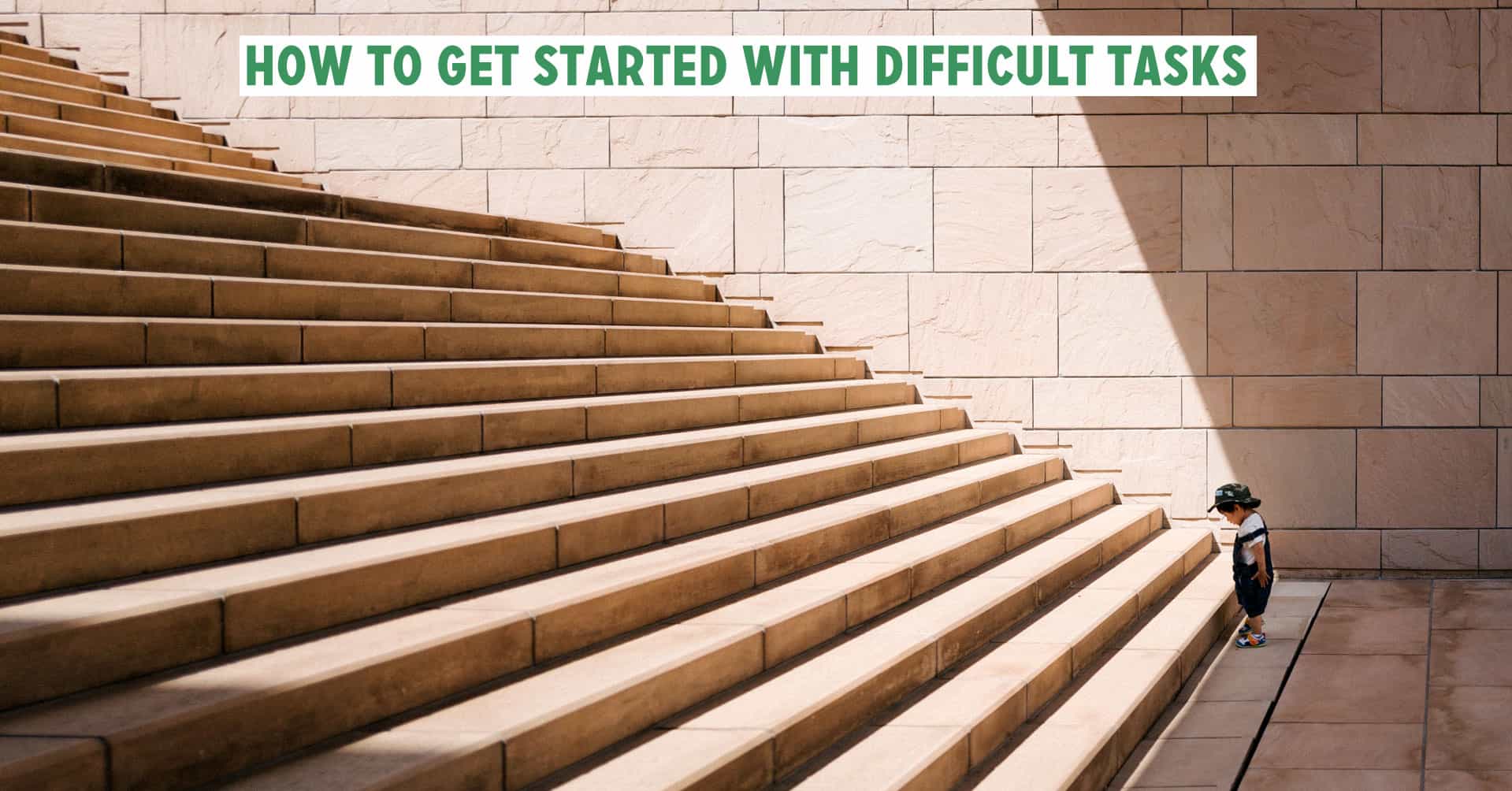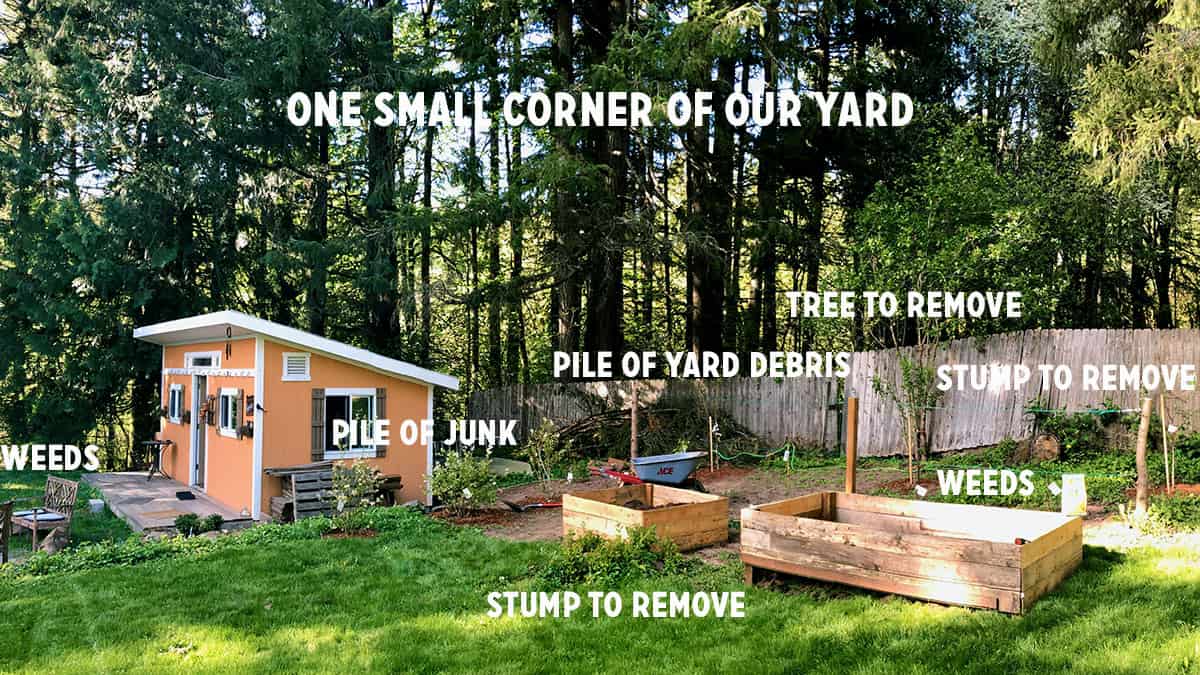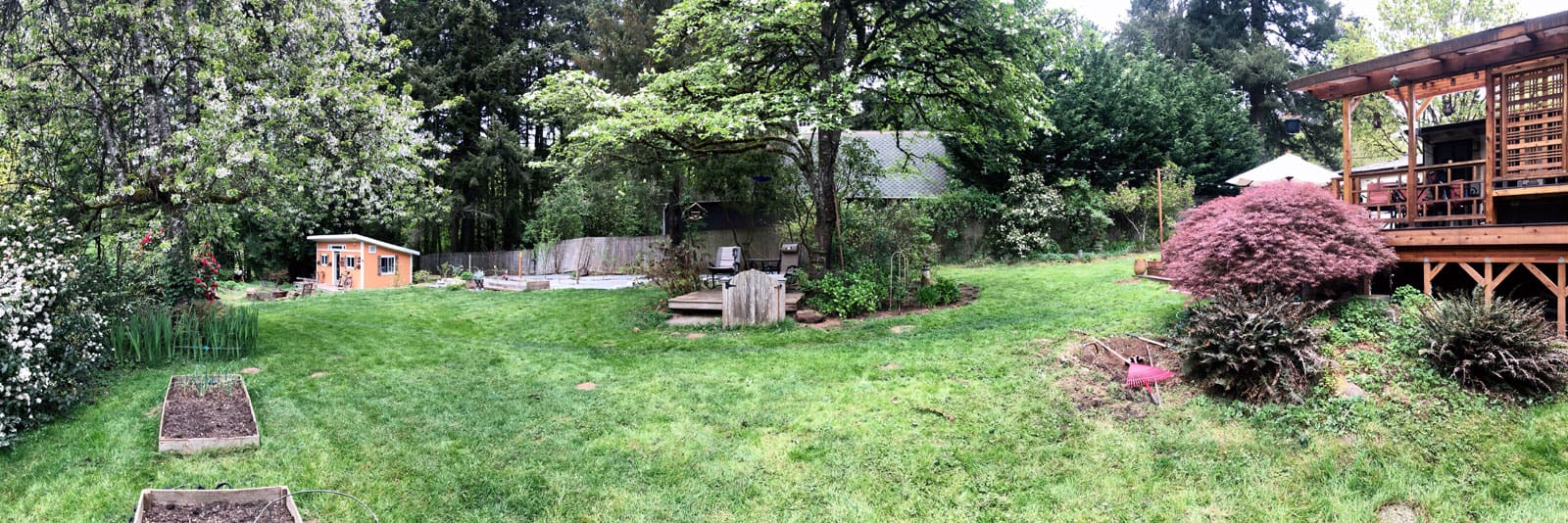How to get started with difficult tasks

Yesterday in the /r/financialindependence community on Reddit, /u/mkengland asked a seemingly innocent question:
What made you stop planning/researching financial independence and actually start?
Was there a tipping point for you where you finally felt ready to start your FI journey? What made you finally take the plunge, open that first IRA/brokerage account/etc., and throw your money into the market?
[…]I’m waffling over details, though…and can’t seem to just DO IT.
This question seems innocuous, right? Yet, I’ve been thinking about it for the past 24 hours.
I hear questions like this relatively often. People want to know how to get started with saving and investing. Or with debt reduction. Or they want to know how to get started with budgeting. And, in fact, it’s the sort of question I had too back when I started my own journey away from debt and toward financial freedom. It all seems so overwhelming! Where do you begin?
Trust me, I know how easy it is to over-complicate things. My ex-wife used to call me Overanalytical Man due to my superhuman ability to overthink even the simplest subject. Although I do this less often (and less severely) than I used to, it’s still a problem that plagues me.
Today, let’s talk about what I’ve learned about how to get started with difficult tasks.
Action Not Words
Generally speaking, things aren’t as complicated as I (or you) want to make them out to be. Most problems can be solved with simple solutions. It’s how we implement these solutions that adds layers of complexity.
A healthy weight, for instance, really is as simple as “calories in, calories out”. Yes, I realize there’s a lot of debate about this subject in recent years. And yes, I understand there’s additional nuance and complexity to the discussion. But that doesn’t change the fundamentals: If you want to lose weight, you have to burn more calories than you consume.
Likewise, all of personal finance boils down to one simple rule: To build wealth, you must spend less than you earn. End of story. This is the fundamental rule of personal finance, and all of the books and blogs and TV shows about money — all of the added layers of complexity — are simply clothes draped across this basic body.
When I see questions like “How do I get started toward financial independence? It all seems so complicated!”, my mind immediately goes to this. How do you get started? By spending less than you earn. Want to get out of debt? Spend less than you earn. Want to save for a down payment on a house? Spend less than you earn. It all comes back to this one idea.
Any move that increases your income or decreases your spending is a step in the right direction.
In a way, allowing perceived complexity to prevent you from doing the right thing is a variation of the optimization trap. The optimization trap is the belief that small tweaks make more difference than they actually do. Optimizing small things (clipping coupons, say) is often a way for people to feel like they’re doing something meaningful when they’re actually avoiding big, scary moves that could truly make a difference (downsizing their home, for example).
When people like me overcomplicate things at the start, we’re doing so for similar reasons. We’re nervous about making big changes. We’re complacent. We’re comfortable with our lives at the moment, so instead of doing the things we know need to be done, we spin our wheels while focusing on details that don’t matter.
Right now, for instance, I am fat. There’s no way to sugarcoat it. I’ve been gaining weight for several years now, and thanks to this quarantine, I’ve reached peak J.D. (in terms of size, anyhow). I know what I need to do to get fit again — eat less, exercise more — but I find it very easy to allow stupid details to prevent me from doing the right thing. “My bike needs a new tire. I don’t have weights at home and the gyms are closed. I don’t like vegetables. I don’t know which tool to use to track my calories.”
All of these details are bullshit that distracts me from the fundamental problem: I need to burn more calories than I consume, and I’m not doing that.
If I want to get started with weight loss, I must achieve (and maintain) a calorie deficit. If /u/mkengland wants to reach financial independence, (s)he must spend less than (s)he earns. In both cases, thinking and deliberating does nothing. To achieve our goals, we must take action.
Start Where You Are
For overthinkers like me, action is key. Instead of finding the perfect time and place to start, we should start anywhere. Screw perfection! When starting a long journey, a perfect first step isn’t critical. If you stumble at the start of a sprint, you’re likely to lose the race. But if you stumble at the start of a marathon, it makes no difference. All that matters is that you’ve begun running.
As my friend Paula Pant once told me, “An imperfect plan you follow is better than a perfect plan you don’t.”
One of the core tenets of the Get Rich Slowly philosophy is that the perfect is the enemy of the good. Too many people never start putting their finances in order because they don’t know what the “best” first step is. Most of the time, “best” is irrelevant in this context. Don’t worry about getting things exactly right — just choose a good option and do something to get started.
Here’s a non-financial example from my own life.
As you know, Kim and I moved into our country cottage nearly three years ago. For the first couple of years, our time and money and attention were focused on home renovations. There were a lot of repairs that had to be made. Last year, we took a break. But this year? Thanks in part to the coronavirus quarantine, we’ve begun tackling our yard.
We have an acre of land. About half of it is seldom-used forest that slopes down the hill to a creek. But the other half is our fenced yard. It’s a gorgeous park-like setting — or could be, if it were maintained. But the previous owners let things get out of control, and we’ve done little more than tread water since we bought the place. We’ve kept things from getting worse, but haven’t done anything to make things better.
Here’s a February photo of one corner of our yard:

This year, though, Kim and I have resolved to make our park-like setting actually park-like. That’ll require a lot of work. Like, hundreds of hours. In February, we toured the yard to talk about what we needed to do. We each made a list as we walked along. When we finished, we were both overwhelmed.
“There’s so much,” Kim said. “Where do we start?”
“I don’t know,” I said. “I guess we start with whatever feels most pressing.” We drafted a short prioritized list of projects…and then never followed it. (Seriously. The top thing on our list remains undone two months later haha.)
Instead, here’s how things went down.
On her first day laid off from work, Kim went outside to play with the dog and the cats. She got distracted by some weeds in the “tea garden”, so she paused to pull them. This led her to prune the climbing rose. Then she hauled the yard debris to the bottom of the hill, where she found more yard debris that needed to be cleaned up. And so on. Before she realized it, she’d put in a full day of work. But it wasn’t the work we’d planned.
What we’ve found is that if we go outside, we’ll see something that needs to be done. If we do that thing, a second step will become self-evident — or we’ll see something else that needs done nearby. In other words, if we simply put ourselves in motion, if we do anything that contributes to our future vision of the yard, we’ll continue to work on the yard, continue to be productive, until we’re tired and done for the day. It doesn’t matter which chore we choose. All that matters is that we choose a chore.
Kim has been home for maybe six weeks now. (Who knows anymore? My sense of time has warped.) In those six weeks, we’ve made huge strides. Sure, there’s still much left to do, and we know it. But every day, we do a little more. Our yard has already been transformed, and it’s only going to get better as we continue to do more work.
This is a current panorama of the entire yard (click to open larger image in new window):
Here’s the (very obvious) moral of this story: Start where you are. Do what you can with what you have. Don’t concern yourself with “right” or “best” options. Choose a good option and get going.
When tackling a big project — whether that’s renovating a yard, digging out of debt, or saving for early retirement — it matters less how you begin than that you begin.
How to Get Started
I grew up Mormon. One of the songs we sang in Primary (a.k.a. Sunday School) was called “Do What Is Right”. I think of it often, even today. Here’s the chorus:
Do what is right; let the consequence follow.
Battle for freedom in spirit and might;
And with stout hearts look ye forth till tomorrow.
God will protect you; then do what is right!
“Do what is right; let the consequence follow.” Yes! Exactly! Nowadays, I’ve incorporated this idea into my personal philosophy.
On my office computer, I have a sticky note: PROCESS NOT OUTCOME. This is a reminder to myself that I cannot control outcomes. I can only control effort.
If I do what is right — that is, if I do what is necessary to achieve what I want — and if I do my best, then I’ve done my part. By doing what’s right and doing my best, I’ll likely get the results I’m after. But if the results aren’t what I wanted? Well then, I can live in peace. I know I did what I could, and I’m fine with that.
I can control my effort and actions, but I cannot control the results.
This “PROCESS NOT OUTCOME” reminder is important to me, and not only because I’m Overanalytical Man. I’m also paralyzed by self-doubt. It’s easy for me to not take action because I’m afraid.
So, when I take on a big project like the course I just wrote for Audible, I often find it tough to get started. Before I even begin, I’m already imagining how painful it will be to read reviews from people who hate my work.
“PROCESS NOT OUTCOME” is a reminder that if I work hard and provide good info, then I’ve done my part. I can only control what I put into a project, not what others think of it.
So, let’s return to the Reddit question that inspired this all. How do you get started with difficult tasks? Easy. By doing anything that moves you toward your goal.
Don’t make things more complicated than they have to be. Identify fundamental principles and pursue them. Especially at the start, don’t worry about making perfect choices or about optimization. Simply start. Take action. You can optimize later.
Do what is right. Do your best. Let the consequence follow.
Become A Money Boss And Join 15,000 Others
Subscribe to the GRS Insider (FREE) and we’ll give you a copy of the Money Boss Manifesto (also FREE)

